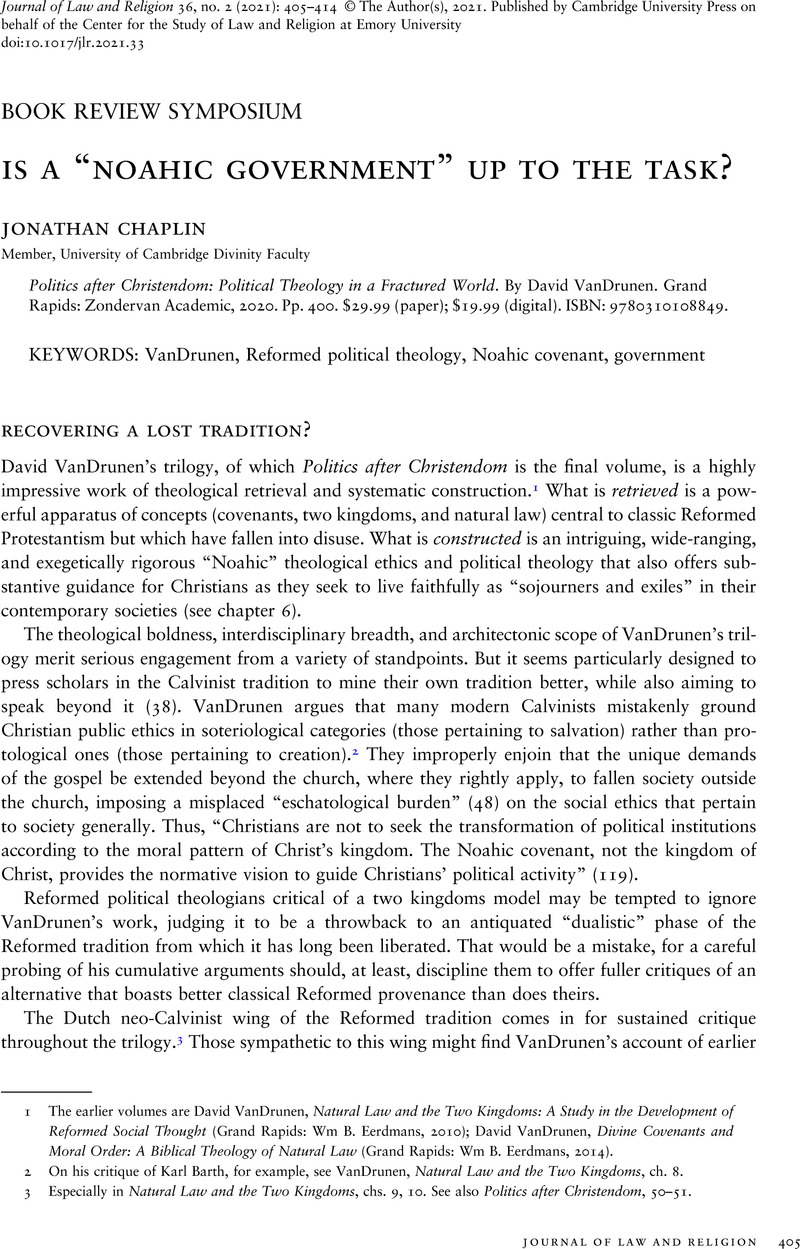No CrossRef data available.
Published online by Cambridge University Press: 29 July 2021

1 The earlier volumes are VanDrunen, David, Natural Law and the Two Kingdoms: A Study in the Development of Reformed Social Thought (Grand Rapids: Wm B. Eerdmans, 2010)Google Scholar; VanDrunen, David, Divine Covenants and Moral Order: A Biblical Theology of Natural Law (Grand Rapids: Wm B. Eerdmans, 2014)Google Scholar.
2 On his critique of Karl Barth, for example, see VanDrunen, Natural Law and the Two Kingdoms, ch. 8.
3 Especially in Natural Law and the Two Kingdoms, chs. 9, 10. See also Politics after Christendom, 50–51.
4 VanDrunen does so more fully in Divine Covenants and Moral Order, ch. 9. For defenses of the “one kingdom” perspective, see Ryan C. McIlhenny, ed., Kingdoms Apart: Engaging the Two Kingdoms Perspective (Phillipsburg: Presbyterian & Reformed, 2012). This, however, appeared before the publication of Divine Covenants and Moral Order and Politics after Christendom.
5 Not all justice has to be delivered by the state. There are non-state “judicial associations,” such those offering private arbitration or private security. The former are widely recognized in Western societies. VanDrunen does not address the extent of the authority of the latter.
6 Thus, Noahic government must uphold wide religious liberty (193–213).
7 As an institution with a universal mandate, government relief could still be legitimate for those with no other source of aid, but such a role “stands on the outskirts of legitimate state authority” (348).
8 See Wolterstorff, Nicholas, The Mighty and the Almighty: An Essay in Political Theology (Cambridge: Cambridge University Press, 2013)Google Scholar; Wolterstorff, Nicholas, Journey toward Justice: Personal Encounters in the Global South (Grand Rapids: Baker Academic, 2013)Google Scholar.
9 In chapter 11, VanDrunen offers several pointed rejoinders to Woltertorff's arguments that are, on this issue, admittedly undeveloped.
10 Oliver O'Donovan, The Ways of Judgment (Grand Rapids: Wm B. Eerdmans, 2005), chs. 3, 4.
11 This echoes neo-Calvinism's affirmation of the “legal sphere sovereignty” of plural associations, as Herman Dooyeweerd puts it. See Jonathan Chaplin, Herman Dooyeweerd: Christian Philosopher of State and Civil Society (Notre Dame: University of Notre Dame, 2011), chs. 9, 10.
12 VanDrunen suggests that where state enforcement is weak and customary practice persistently deviates from state law—as in gambling, narcotics, or prostitution—customary legal order has in fact prevailed.
13 Julian H. Franklin, ed., Constitutionalism and Resistance in the Sixteenth Century (New York: Pegasus, 1969); John Witte, Jr., The Reformation of Rights: Law, Religion, and Human Rights in Early Modern Calvinism (Cambridge: Cambridge University Press, 2007).
14 For a theological argument for representative democracy, see Chaplin, Jonathan, Faith in Democracy: Framing a Politics of Deep Diversity (London: SCM, 2021)Google Scholar, chs. 1, 2.
15 R. H. Tawney, Religion and the Rise of Capitalism (Harmondsworth: Penguin, 1937 [1926]).
16 Polanyi, Karl, The Great Transformation: The Political and Economic Origins of Our Times (Boston: Beacon Press, 2001 [1944])Google Scholar. See also, Goudzwaard, Bob, Capitalism and Progress: A Diagnosis of Western Society (Grand Rapids: Wm B. Eerdmans, 1979)Google Scholar, a work influenced by neo-Calvinism.
17 For example, the emergence of individual dignity (Larry Siedentop), religious freedom (Timothy Shah and Allen Hertzke), constitutionalism (Brian Tierney, John Witte), dispersed sovereignty (Jean Bethke Elshtain), an independent civil society (Charles Taylor), and democracy (Jacques Maritain).
18 Tom Holland, Dominion: The Making of the Western Mind (London: Little, Brown, 2019).
19 John Courtney Murray, “Are There Two or One?” in We Hold These Truths: Catholic Reflections on the American Proposition (Kansas City: Sheed and Ward, 1960), 197–217; Sheldon Wolin, Politics and Vision: Continuity and Innovation in Western Political Thought, expanded edition (Princeton: Princeton University Press, 2004), ch. 4.
20 Divine Covenants and Moral Order, ch. 7. See also Politics after Christendom, 88–92.
21 For an excellent analysis of Mosaic law, see Burnside, Jonathan, God, Justice and Society: Law and Legality in the Bible (New York: Oxford University Press, 2012)Google Scholar.
22 Especially in Politics after Christendom, chs. 3 and 4, and Divine Covenants and Moral Order, ch. 7.
23 Luigino Bruni and Stefano Zamagni, Civil Economy: Efficiency, Equity, Public Happiness (Oxford: Peter Lang, 2007). Or it might resemble the position outlined by Goudzwaard in Capitalism and Progress and other works.
24 As O'Donovan notes, rulers can be guided by “evangelical” norms even in exercising secular political office, such as by remaining “humble” or by tempering justice with mercy. See O'Donovan, Oliver, The Desire of the Nations: Rediscovering the Roots of Political Theology (Cambridge: Cambridge University Press, 1996)Google Scholar, chs. 6, 7.